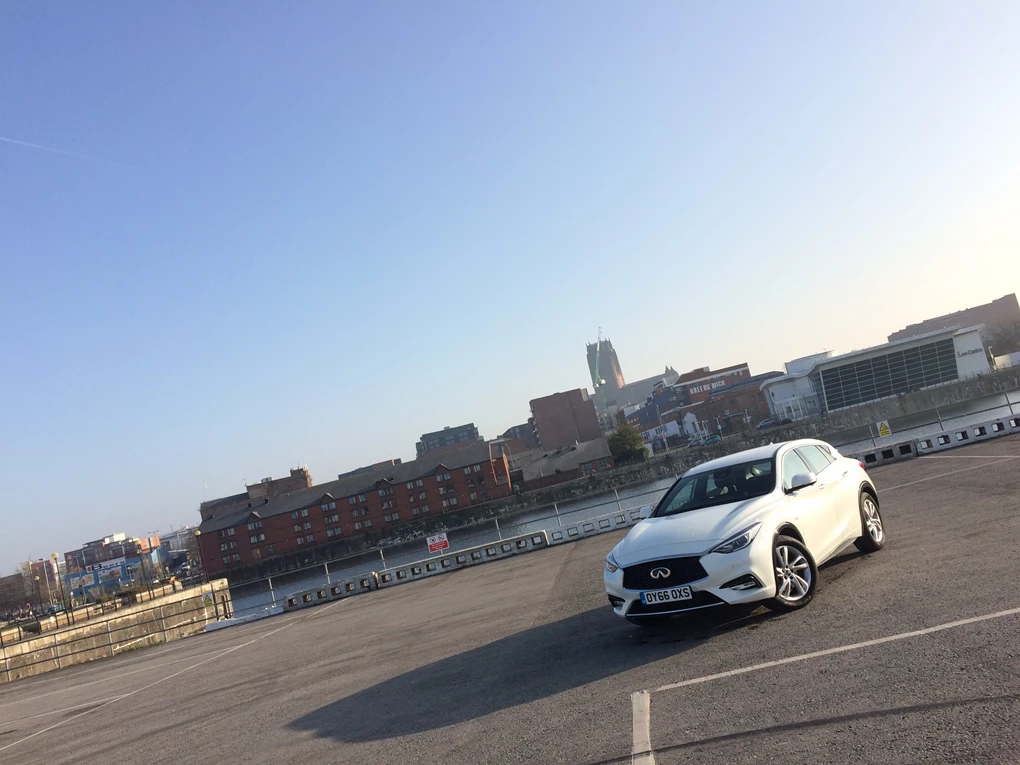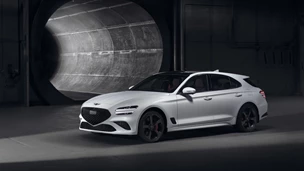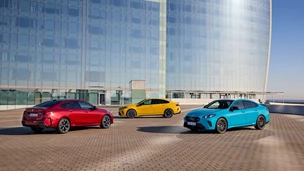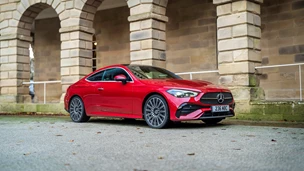It’s fair to say that INFINITI hasn’t had quite the success here in the UK that it would like: a couple of years ago, it was only selling cars in the triple figures in these shores. Slowly but surely things are turning around, but it’s the new Q30 hatchback which INFINITI expects will really bring it into the mainstream.
Now, you might sniff and say, well, it’s just a posh Nissan isn’t it? But flippancy aside, this car has more in common with a Mercedes than a Micra given that it’s based on the same architecture as the A-Class.
Underpinnings aside though, it’s very obviously an INFINITI with the same swooping lines and contours that are hallmarks of the manufacturer’s design. It’s certainly smart, then, and rivals the usual suspects in the premium hatch segment like the BMW 1 Series, Audi A3 and its Benz-branded relative.
Built in Sunderland in the same plant as the Nissan Juke and Qashqai, the Q30 aims to be a British-made alternative to its Teutonic rivals but without sacrificing on quality, or comfort. But is it any good?
Performance
You can have the Q30 with a variety of engines, including a 120bhp petrol and a much more powerful 208bhp petrol which is available on the range-topping Q30 Sport trim, but it’s the diesel options which will likely catch the eye of most buyers in Britain.
The standard one is a 108bhp 1.5-litre unit, but it’s the 168bhp 2.2-litre diesel which we tested which we reckon is the best all-rounder and the pick of the bunch. It’s not a particularly exciting engine but it suits the car’s mile-muncher character well, it’s smooth upon acceleration and has a decent amount of punch when you put the boot down.
When equipped with four-wheel drive like our test car, it can scramble from 0-62mph in a fairly spry 8.5 seconds before going on to a 134mph top speed, but even in Sport trim it’s not really the sort of car you’d be obsessing over the numbers with.
More important is its mid-range punch, with 350Nm of torque available from just 1,400rpm that can scoot you up the road and makes overtaking a breeze.
Like all diesels it can sound a little gravelly under hard acceleration, but it settles down to a quiet tick when you’re cruising along and the noise-cancellation system which comes as an option goes a long way towards further improving the car’s refinement.
As standard, the Q30 comes with a six-speed manual gearbox, though it’s the seven-speed dual-clutch automatic that we’d recommend for the best refinement and the smoothest driving experience.
Ride and Handling
It’s impressively smooth and refined to drive, and quite possibly the most comfortable car in its class
The Q30 is nothing if not smooth. From the get-go, you can tell that it’s been engineered and set-up specifically to be a car that drivers will enjoy doing long distances in. It’s impressively smooth and refined to drive, and quite possibly the most comfortable car in its class. Part of that is due to the relaxing suspension setup which eats up the miles, while the active noise cancellation goes a long way towards keeping it hushed even at higher speeds. It’s worth noting that if you opt for the Sport trim it’s much less cosseting. Sport models come with lower, stiffer suspension which offers much less comfort and not much more by way of fun. In terms of driving dynamics the Q30 certainly isn’t up there with the best. There’s plenty of grip, but it’s not a particularly exciting experience thanks to a fair amount of body roll and rather vague steering. As a result, if you’re looking for the best drive in class, the BMW 1 Series has it comfortably beaten, but in fairness we don’t reckon there’ll be too many complaints from Q30 owners who are annoyed that their cars aren’t super agile.

Interior and Equipment
The INFINITI logo depicts a road stretching into the horizon, intended as a tip of the hat to the manufacturer’s forward-thinking design
Now, we mentioned earlier that the Q30 shares a platform with the Mercedes A-Class, but that’s not all. In fact, any Merc fans will probably recognise the same infotainment system and COMAND scroll wheel interface, but don’t knock it down as badge engineering. Thing is, ‘premium’ and ‘German’ are two words that tend to be used interchangeably these days, sometimes erroneously. But despite the fact that is shares so much Mercedes DNA, the Q30 manages to be premium without being too, well, German. It’s certainly nicer inside that you’d find in an everyday hatch with plush and upmarket materials, soft leather and suede-effect roof liner. Sure, some of the plastics lower down in the cabin give away its Nissan heritage and the controls aren’t quite as intuitive as you might like, but you can tell INFINITI has worked hard to make it a comfortable and enjoyable place to be for long motorway journeys. Trim options are extensive – there’s seven of them in total – with standard equipment including air conditions, a seven-inch touchscreen and parking sensors, but no DAB radio or sat-nav. For that, you’ll have to opt for a more expensive trim like our Premium Tech test model, which brings with it things like leather seats, some fancy wood trimmings and automatic LED headlights along with a handy surround-view parking camera. Safety is a big focus too, and all models get a five-star Euro NCAP safety rating, along with seven airbags and autonomous emergency braking. Bad bits? Well, the chunky pillars impede on visibility out of the cabin, while despite the fact that it’s physically larger than many of its rivals the Q30 has less interior space. Headroom feels tight, as does legroom and shoulder room, but the five doors open at a near-90 degree angle, which makes for easy access. It’s also got a well-sized boot with 430 litres of space, which makes it more practical for carrying luggage than all of its direct rivals. The rear hatch opening is wide too, making it easy to get larger items like furniture or flat-packs inside.
Cost
The Q30 is an expensive car to buy outright though, with the entry-level model costing more than the standard 1 Series or A3.
The Q30 is an expensive car to buy outright though, with the entry-level model costing more than the standard 1 Series or A3, and without much more to show for it in terms of equipment. Pricing starts from £19,671 while our specific test model is just shy of £31,000. The range-topping Sport trim, meanwhile, starts from close to £30,000 as well. INFINITI claims that the 2.2-litre diesel can return a combined 57.7mpg with 134g/km of CO2, decent figures on paper though in the week that we had it, we managed to coax only 45.6mpg, some way short of the official figures.
Our Verdict
The INFINITI Q30 has hardly reinvented the wheel when it comes to the luxury hatchback class, and it’s unlikely to have any of its German rivals sweating under the collar, but it’s certainly a competitive and desirable alternative to the usual suspects in its class. It’s stylish, comfortable and fantastically smooth to drive, and despite the fact that it’s on the pricey side and not the best car in its class in terms of outright luxury or in terms of driveability, it’s sure to appeal to those who want a nice car that’s just a bit different from the rest. In any case the car proves that it’s more than just a dressed-up Nissan, and although the INFINITI brand is still a work in progress here in Britain, the Q30 is a sign that it’s progressing well.





